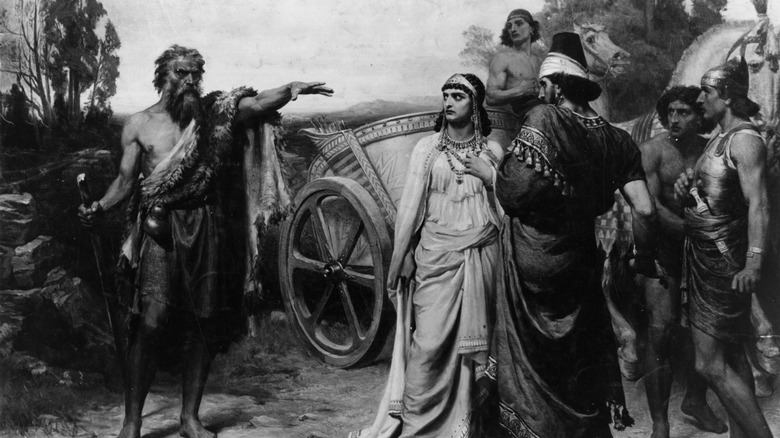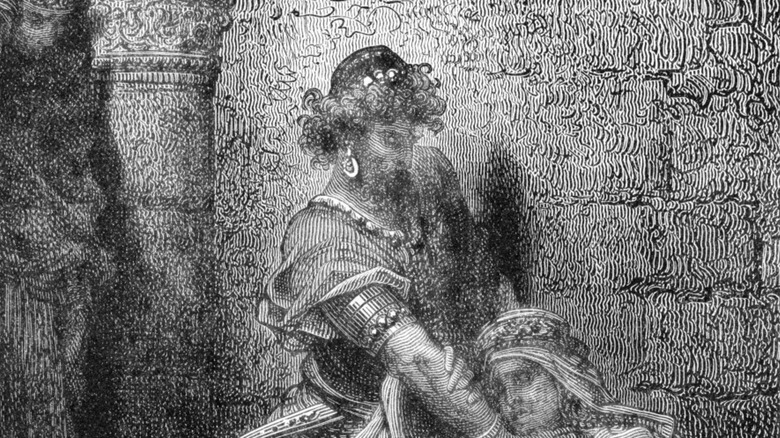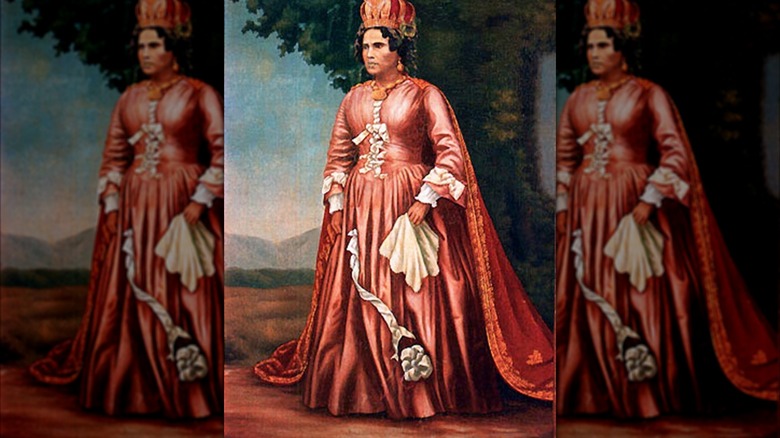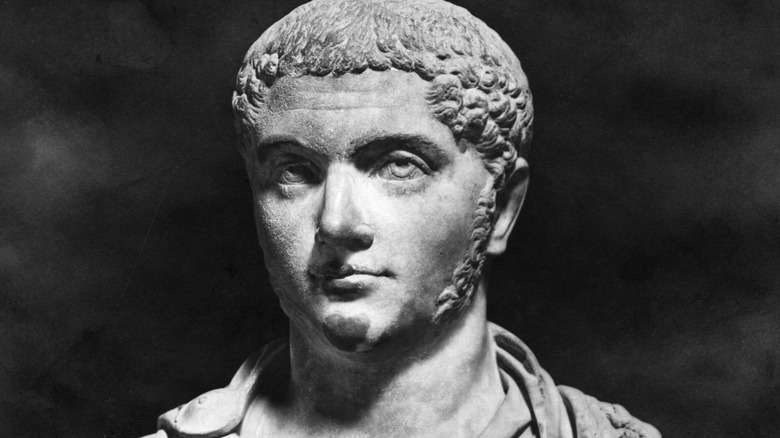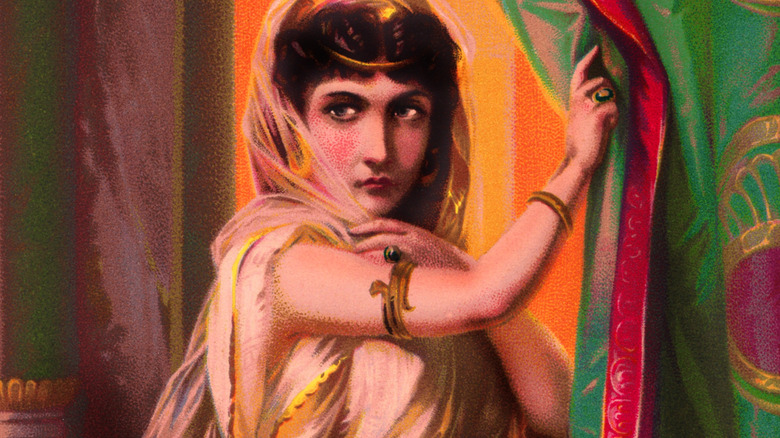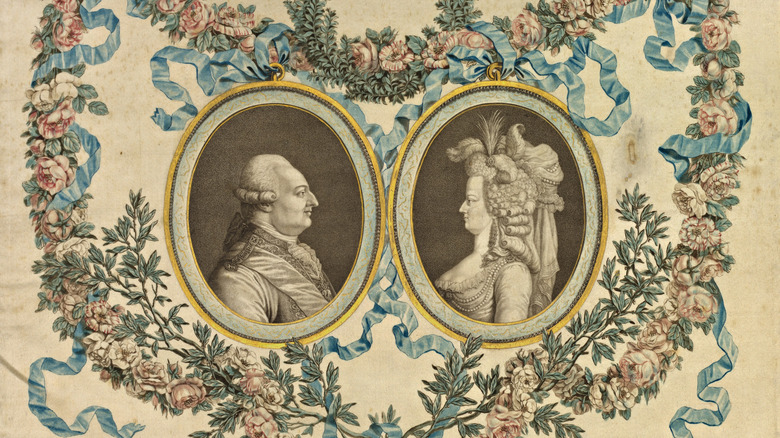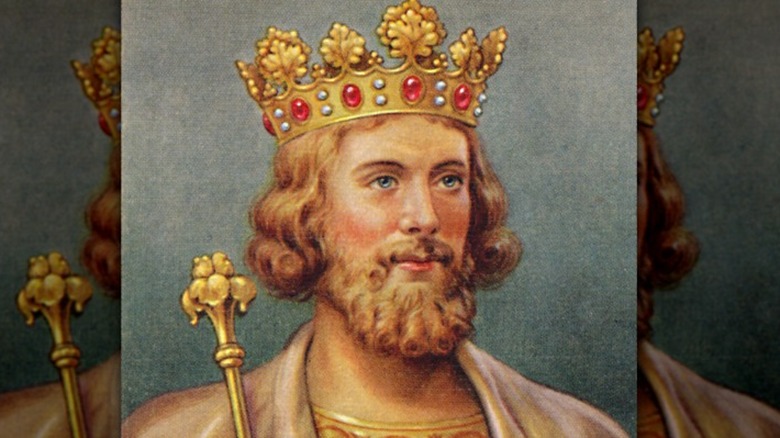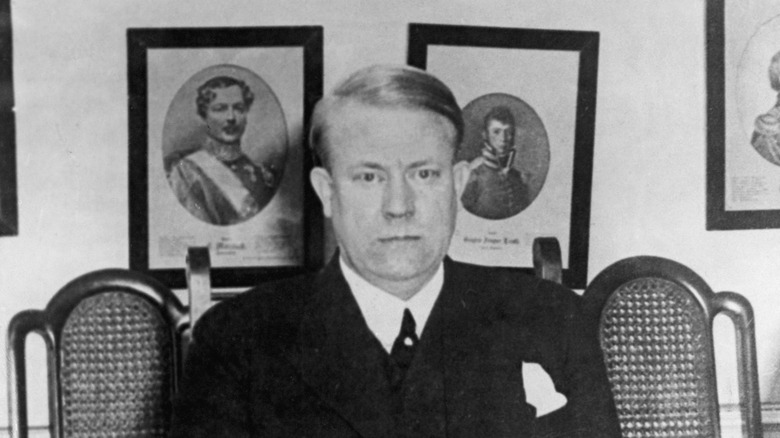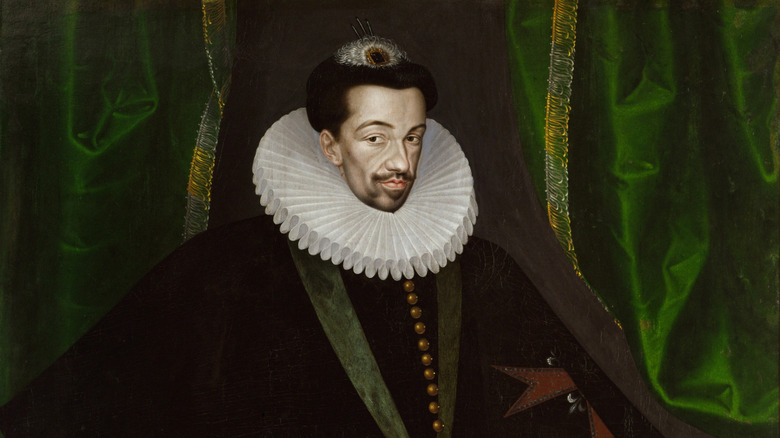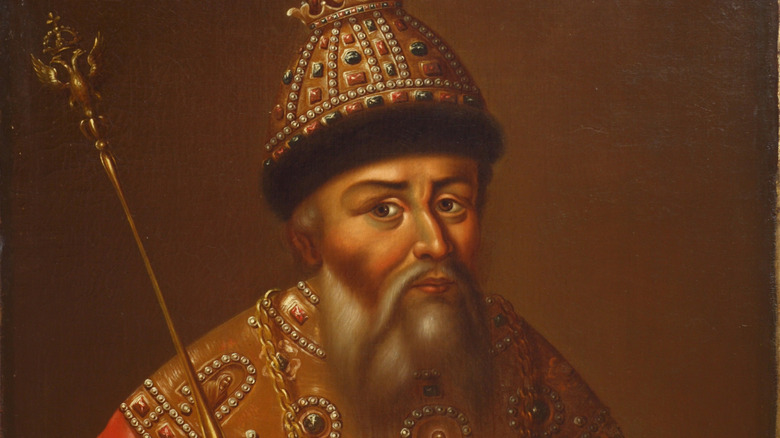The Most Hated Rulers Of All Time
You don't go into government to make friends — or at least, you shouldn't. Running a country can be a thankless job, since no matter what you do, you'll wind up alienating, annoying, or downright infuriating some segment of the population. (Granted, this can't-please-everyone axiom is true for trying to manage any group of people of any size.)
Some leaders go well beyond the standard, unavoidable amount of haters, though. The history of the world is littered with leaders whose names are seldom uttered without a sneer or a curse — and even a few whose names went on to become generalized terms for traitors or malicious actors. Some of these leaders were genuinely wicked, while others had the misfortune to run (or attempt to run) nations during times of challenge or upheaval that required skills well beyond what they had been blessed with. Regardless, their careers show that some of the world's most memorable rulers are also among the most despised.
Alexios V Doukas
The big, this-time-it's-forever fall of Constantinople came in 1453, when Turkish cannons pulverized the famous walls of the city, but there was a prequel: the Sack of Constantinople of 1204. The City of the World's Desire had stood up to a laundry list of besiegers, but an army of Western crusaders more interested in money than actually retaking Jerusalem, deep in debt to the Venetian government, managed to take the city twice.
One of the rotating cast of emperors trying to ride the circumstances to the Byzantine throne and stay there was Alexios V Doukas Mourtzouphlus. The Doukases were one of the great Byzantine families; "Mourtzouphlus" is a nickname meaning "with scowling eyebrows." After a complex dance of people, many of them with the name Alexius, variously deposing and blinding each other, Alexius V landed on the Byzantine throne in early 1204, having killed the father-and-son rulers Isaac II and Alexius IV that the Crusader army had installed when they first took Constantinople.
Mourtzouphlus failed to keep out the Crusader army, who now had a reason to take the city again and loot it. The Crusaders bashed down two gates and stripped the city in an orgy of theft and violence. Mourtzouphlus briefly escaped to Thrace, but the man who lost Constantinople was blinded by Alexius III (another former emperor), caught by the Crusaders, and returned to the city he'd bungled away. Blinded and indicted by the Crusader government for the murder of his predecessor, Scowlybrows was marched to the top of a column in Constantinople and tossed off of it.
Nicolae and Elena Ceaușescu
Hard to spell and even harder to love, the Ceaușescus governed Romania during the late 1980s, when communist governments across Eastern Europe were teetering. In capitals across the Warsaw Pact, popular protests led to the toppling or retreat of Soviet-aligned dictators, and the process was generally nonviolent, except in one country. Nicolae Ceaușescu had ordered the suppression (with deadly force) of protests in Timisoara, a pretty city in western Romania called, optimistically but not irrationally, "Little Vienna." Off he went for an official visit to Iran, returning to a furious and inflamed population.
Romania's borders were closed, Bucharest was tense, and nasty Nicolae addressed a crowd only to be met with boos, probably for the first time in his political career. The army joined the protesters and the Ceaușescus fled the capital, only to be arrested in rural Romania and returned to Bucharest under army custody. Violence between security forces loyal to the Ceaușescus and those calling for their fall spread across Romania, and on Christmas Day, the Romanian people got an unexpected gift: the partially televised show trial and execution of the dictator and his wife, an enthusiastic scientific fraud who enjoyed being thought of as an accomplished chemist, despite not actually being one.
After a guilty verdict was returned, the Ceaușescus were led into a courtyard and stood up next to the restrooms. Nicolae sang the communist hymn "The Internationale"; Elena, less composed, swore at her executioners. A hail of bullets sent the couple to whatever reward awaited them.
Ranavalona I of Madagascar
The island nation of Madagascar is fascinating for any number of reasons: its unique animal and plant life, the rich cultural and linguistic heritage of its human inhabitants, and its willingness to allow royal women to lead the government as it attempted to rebuff attempts at colonization. One of these women was, unfortunately for those who crossed her, among the most alarming and frightening queens to ever sit on a throne: the vicious Ranavalona I.
A local Malagasy ruler named Radama, with British help, united most of the island (through conquest) and sidelined the French who had been poking around; when he died young in 1828, his widow Ranavalona took the wheel. Ranavalona was not interested in British help, French influence, or Christianity. She wanted to rule a united and closed Madagascar and was willing to do what she needed to in order to achieve it, including sticking the heads of European invaders on spikes and extracting forced labor from the Malagasy population.
Some of Ranavalona's exploits were likely exaggerated in European accounts, or at least emphasized without the context of what European governments were doing to advance their colonial hustles. It's not hard to imagine why: a nonwhite woman exercising power was not how Europeans sought to organize the world, generally. That said, Ranavalona's government and those of her successors ruled over an island that is estimated to have seen flat population growth from 1820 to 1895 (just before the French finally took control): 75 years without significantly more Malagasies on the board.
Elagabalus
Say what you will about the Roman matron Julia Maesa, but she didn't lack ambition: faced with a power vacuum at the center of the empire, she claimed her grandson was the illegitimate son of a recent emperor with enough vim that this grandson, Elagabalus, made it onto the Roman throne in 217. Fortunately for later artists, but unfortunately for anyone with a material interest in Elagabalus's longevity, the teenage emperor (not two words that go well together) was wild, weird, and queer. He sometimes chose female dress and pronouns, threw bizarre parties featuring foods like camel feet, and attempted to import into Rome the worship of the Levantine god Baal. If this sounds fun, he also married one of the vestal virgins (whose chastity was important to Roman state religion) and had a number of generals killed.
Whether Elagabalus was what we would today consider genderqueer or trans is an open and perhaps unanswerable question, and it's important to note that most of our sources date from after his overthrow and murder in 222. After his death, Elagabalus was subjected to a process later called damnatio memoriae, "condemnation of memory," a Roman practice of trying to obliterate the memory of a public figure by removing their image and name from public spaces. It wasn't wholly successful, of course, and the complex legacy of Elagabalus's brief reign is still intriguing observers some 1,800 years later.
Jezebel
The sassy rockabilly B-side "Hard-Headed Woman," recorded by Elvis and Wanda Jackson among others, calls out three Biblical women as canonically trouble: Eve, of apple fame; Delilah, of nonconsensual haircut fame; and Jezebel, of "her name is now an insult for difficult women" fame. Before she was shorthand for feminine misbehavior, Jezebel was a princess of Tyre (in modern Lebanon) who married King Ahab of Israel. Per the Bible, Ahab quickly erected a temple of Baal, which in a Bible story is how you know things are about to go south.
Queen Jezebel then appears, according to the Biblical narrative, to have struggled for influence with Elijah, a prophet of the Israelite God. She ostensibly connived to have a man murdered so she and Ahab could acquire his vineyard; after Ahab's death, Elijah crowns a rival successor to Ahab and Jezebel's son Joram. This successor, Jehu, kills Joram in battle, dumps the corpse on the stolen land, and marches into the Jezreel Valley to take on Jezebel. The Bible finds her doing her makeup and hair, taunting Jehu when he arrives. She's thrown out the window, trampled by horses, and eaten by dogs in one of the most compelling deaths in the whole Bible, which does not lack for dramatic exits.
Jezebel's name has been an epithet for "bad" women in English since at least the 14th century, but people more sympathetic to this glamorous and sharp-tongued queen will be glad to know that her name is also used for several species of colorful Asian and Australian butterflies.
Louis XVI and Marie Antoinette
Louis XVI, king of France, and his Austrian wife Marie Antoinette caught one of the hottest potatoes ever tossed into royal hands: a France simmering with resentment and revolution. While people seldom revolt against governments they're happy with, Louis XVI was not generally hated early in the French Revolution, with his people generally reserving their ire for his advisers and his wife. Both during her life and after her death, Marie Antoinette has been the locus of any number of rumors, but regardless of their accuracy, enough of the French believed enough bad things about her to inflame revolutionary passions even further.
In June 1791, Louis and Marie Antoinette decided to make a break for it, bolting toward the Austrian Netherlands (modern Belgium and Luxembourg, more or less, governed by the queen's sister) in hopes that they could raise an army and topple the revolutionary government. They got caught just short of the border, and emotions toward the king soured immediately. Now seen as someone willing to abandon his people and subject them to foreign invasion, the king found himself unprotected by the French people's former goodwill. He went to the guillotine in January 1793; his unlucky queen followed him that October.
Charles I of England, Scotland, and Ireland
Charles I of England, Scotland, and Ireland (not yet formally the United Kingdom), son of King James of Bible fame, alienated his subjects in two areas that an early modern king really, really couldn't afford to: religion and money. Charles loved ornate "high church" worship and had married a Catholic, which was suspect in Protestant England and Ireland, and he also enjoyed spending money, especially on art. Frustrated with Parliament trying to limit his powers and spending, he attempted to rule without consulting the legislature for 11 years, only recalling it when he needed money.
Tensions over money became tensions over authority, and in the summer of 1642 the violence that had begun earlier in Scotland and Ireland boiled over into open war engulfing all three countries. The complex system of civil wars that shook Charles's kingdoms became known to later scholars as the Wars of the Three Kingdoms, as armies smashed into each other across the British Isles.
Charles's supporters in England were neutered militarily by 1646, but Charles continued to negotiate with all parties who would speak to him in order to remain king. He botched this so badly that England and Scotland — both of which Charles was king of — fought a brief war in 1648. This led the English Parliamentarian army to push for Parliament to order Charles's death. Over some objections, they obliged, and Charles I met the axe in January 1649.
Edward II of England
Families can be complicated, royal families especially so, but it takes a lot of mismanagement to get overthrown by your own wife. Edward II of England was a handsome, musical animal lover; unluckily for his political career, he was also gay and liked bad boys. As soon as his father died in 1307, he called his "favorite" (wink) Piers Gaveston back from the exile Edward I had sent him into. Edward II gave his beau the Duchy of Cornwall, among other special favors, which so enraged the existing English nobility that they killed Gaveston in 1312.
Learning nothing, Edward II found an even nastier special friend, Hugh Despenser, in 1318; Despenser hated Queen Isabella of France and, among other slights, had her children removed from her care. Isabella went to France on a diplomatic errand in 1325, later having her son Edward, the heir, sent to join her. This was a colossal mistake, as the queen went on to organize a rebellion against her husband and an invasion of England. Edward and Hugh were bounced from power, with Edward formally abdicating in 1327 in favor of the 14-year-old Edward III.
Legend has it that Edward II was killed later in 1327 by having a hot poker inserted into his rectum. This would do it, of course, but this is probably a (homophobic) myth: he was more likely killed by suffocation, as earlier accounts report, but historian Ian Mortimer thinks he lived on for a number of years.
Vidkun Quisling
On April 9, 1940, when German forces were swarming Norway, Vidkun Quisling was ready. After all, he had already exhorted Hitler to invade his home country in December 1939, and they had done so. The far-right Norwegian politician announced on the radio that he was forming his own right-wing government, hoping the advancing Germans would prop it up. King Haakon VII fled rather than support Quisling, and the Germans, not really needing to negotiate at this point, set up one of their own to govern Norway once the invasion was complete. However, the occupation government did pull Quisling in as a government functionary, naming him "minister president" in 1942.
The Norwegians, to their credit, generally weren't buying what Quisling was selling. On May 9, 1945, Quisling was arrested at his villa outside Oslo. He was blamed for the deportation of nearly 800 Norwegian Jews, most of whom died at Auschwitz. For treason, murder, and related crimes, Quisling was sentenced to death and executed in Oslo on October 24, 1945.
"Quisling" was first used as a synonym for "traitor" in English in 1940, just a few days after the fall of Norway. It has remained in occasional use ever since, to the shame of Vidkun's memory and the delight of Scrabble enthusiasts.
Henry III of Poland-Lithuania and France
Henri III foreshadowed his selfish nature and grim fate by giving up his kingdom when a nicer one became available. When the elected throne of Poland-Lithuania came open, Henri's mother, the notorious but effective Catherine de Medici, Queen Dowager of France, arranged for his election. Henri went off to Poland in 1573 and ruled there for a mere 14 months. When the more desirable French throne became vacant after Henri's brother Charles IX's death, back to Paris he went.
The last male heir of the Valois dynasty, Henri inherited a France that had been clawing itself to ribbons in religiously based civil wars for over a decade. While he was a competent military leader, he also spent too much money and surrounded himself with suspiciously handsome male favorites nicknamed "mignons," which more or less means "cuties." Between his apparent homosexuality, budget woes, and insufficient hatred of Protestants, he alienated many of his subjects. Henri wound up fleeing Paris, joining with his relative and former foe Henri of Navarre to retake the capital.
It's never a good look to be leading an army against your own capital; it's an even worse look when you're assassinated by a friar, as Henri was on July 31, 1589, ending the line of the Valois kings of France and, briefly, Poland-Lithuania.
Ivan the Terrible
"Terrible," as in Ivan the, is probably better translated as "awe-inspiring" from the original Russian, but this linguistic note shouldn't make you think he wasn't also terrible in the conventional, modern sense. Ivan IV hated the bickering boyars who made up the Russian nobility, so he killed a lot of them. Some were executed for perceived treason, others simply so Ivan could clear a territory around Moscow that he could rule directly, with no noble interference. To consolidate his rule over Russia, he established a black-clad, black-horse-riding secret police; these oprichniki imposed Ivan's will on Russia and helped him carry out the brutal sack of Novgorod in 1570.
His home life was no better. Henry VIII of England gets a lot of flak for his six wives, but Ivan had at least that many, with most of them preceding him in death. (Details are unclear due to spotty documentary evidence, as the once largely wooden Moscow used to catch fire a lot.) But most notoriously, in 1581 Ivan murdered his heir, Ivan, in a rage.
With his best choice for a successor eliminated, Ivan was unable to prevent his own death from leading to an even worse period in Russian history: the Time of Troubles. Whether Ivan would be pleased to know that future Russian dictators Joseph Stalin and Vladimir Putin cited him as an example of strength to follow is unknowable.
Hadrian
Rome had many incompetent emperors, but Hadrian wasn't among them: tradition historigraphy places him as the third of the "Five Good Emperors" the Romans enjoyed during the heyday of the empire. Hatred for Hadrian was concentrated among one of the many peoples subject to Rome during his reign: the Jews. Judea revolted from 132-136 CE, and this effort at reestablishing local independence was savagely repressed.
Known as the Bar-Kokhba Revolt after its enigmatic leader, the third and last Roman-Jewish war began for reasons that are not totally clear, mainly due to incomplete ancient sources. After hard fighting in the province, the Jewish rebels were destroyed in a final siege near Jerusalem, and the stage was set for Hadrian's reprisals. Colossal numbers of Jews seem to have been killed or enslaved. In insults to the survivors, Jerusalem was reestablished as Aelia Capitolina and Judea rebranded as Palestina; Jews were not allowed to live within sight of the holy city's walls. For these reasons, Jewish-written sources follow Hadrian's name with a vivid curse, even sometimes in the modern day: "may his bones be crushed."
